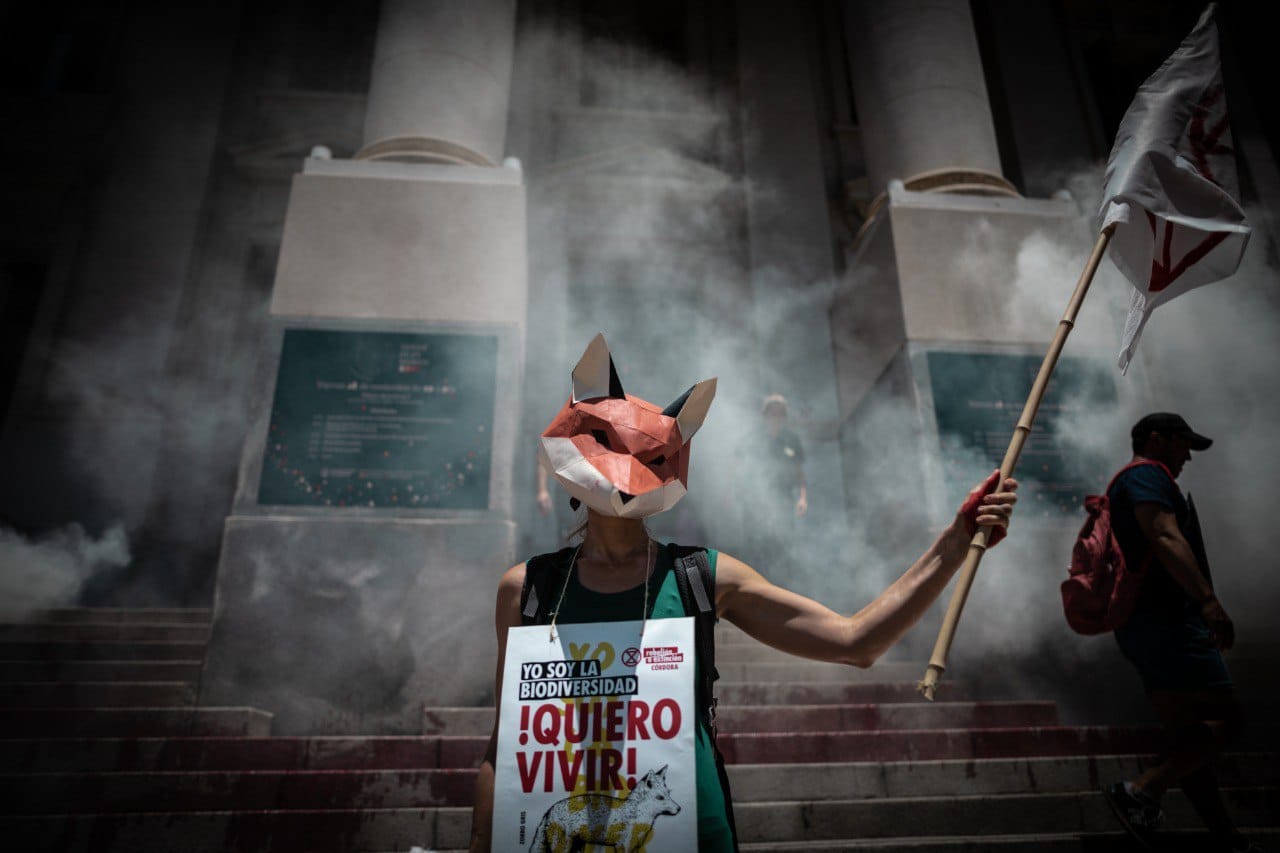
En este número: COP15 | XR Francia vs Forever Chemicals | Stop EACOP |
Querido rebelde,
El 96% de todos los mamíferos de la Tierra son humanos o nuestro ganado. El 4% son salvajes. La humanidad está acabando con la biodiversidad de este planeta, y lo estamos haciendo a una velocidad aterradora.
Las poblaciones de animales en todo el mundo han disminuido un 69% desde 1970 (un 94% si nos limitamos a América Latina y el Caribe). Un millón de especies vegetales y animales se enfrentan a la extinción.
El mes pasado, los gobiernos se reunieron en Montreal (Canadá) durante dos semanas para intentar revertir la mayor pérdida de vida en este planeta desde los dinosaurios. La cumbre de la ONU sobre biodiversidad, conocida como COP15, dio lugar a un nuevo conjunto de objetivos de biodiversidad que deberán cumplirse en la próxima década, conocido como Marco Mundial para la Biodiversidad.
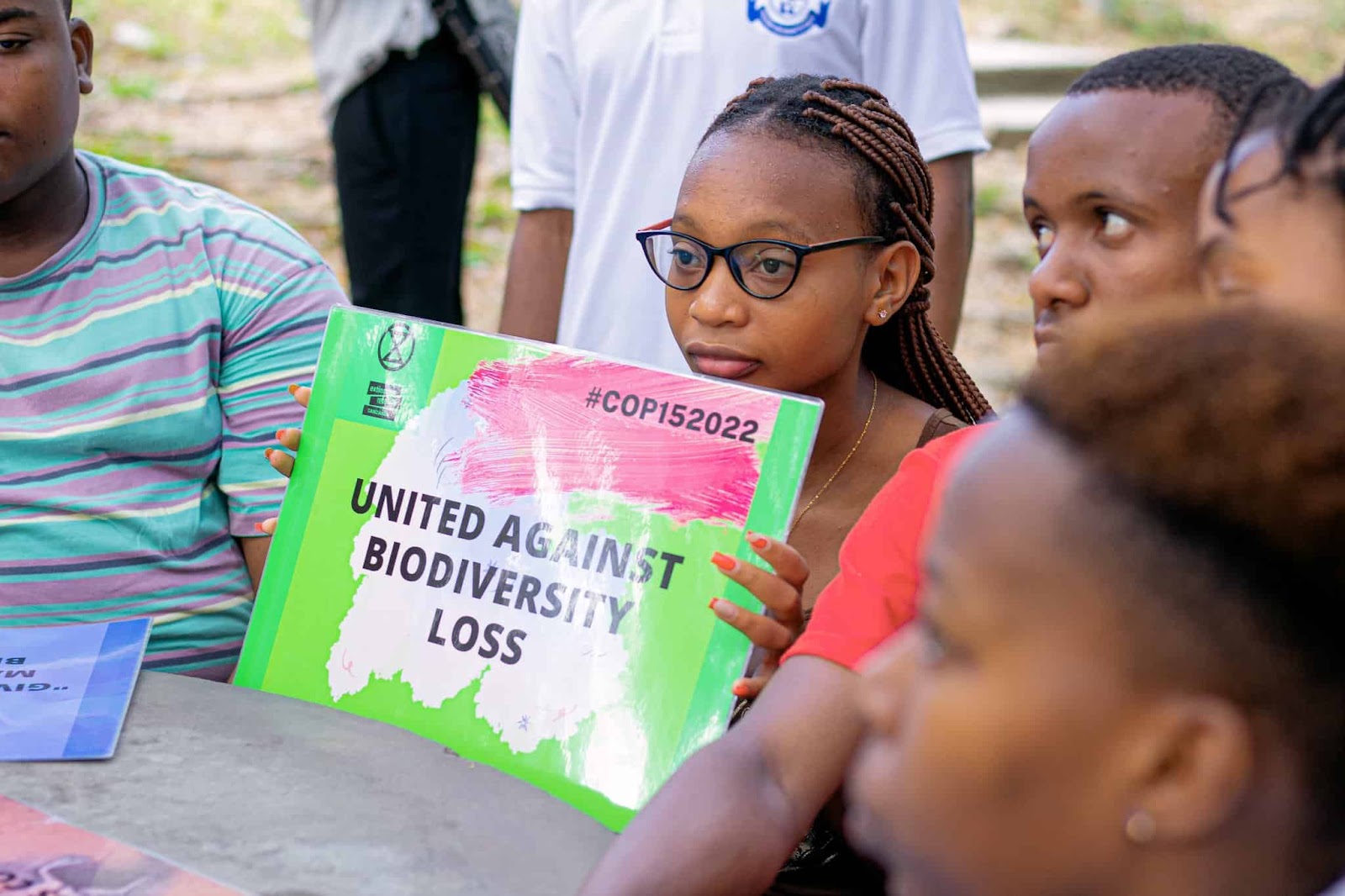
Rebeldes discuten la pérdida de biodiversidad con estudiantes en Tanzania, uno de los muchos seminarios celebrados en toda África durante las negociaciones de la COP15 en Montreal.
Este Marco ha sido calificado de "gran hito" por algunos activistas, y de "fracaso para detener la extinción masiva" por otros. Para más información sobre su contenido y las acciones rebeldes emprendidas durante su negociación, visite la sección "Acciones destacadas".
También puedes escuchar las palabras de una rebelde canadiense que ha luchado apasionadamente por la biodiversidad y asistió a la cumbre en Humans of COP15, y leer más reacciones a la COP15 e historias sobre la pérdida de biodiversidad en Lecturas obligadas.

Rebeldes entran en una planta química tóxica que está envenenando toda una región de Francia.
En este número también informamos de cómo cientos de rebeldes invadieron una fábrica petroquímica tóxica en Francia que está filtrando terroríficas "sustancias químicas para siempre", y dedicamos el Rincón Solidario a los valientes activistas de Stop EACOP, perseguidos por protestar contra un monstruoso oleoducto de crudo que atravesará África Oriental.
Independientemente de lo que pienses sobre los objetivos de biodiversidad que surgieron de la COP15, ninguno de ellos es jurídicamente vinculante. Vivimos en un mundo en el que los acuerdos comerciales están protegidos por la ley, pero los acuerdos para garantizar la supervivencia de un millón de especies son meramente voluntarios.
El consumo excesivo humano ha extendido el extractivismo, la contaminación y la destrucción de hábitats por todo nuestro planeta, y ha extinguido casi tres cuartas partes de su vida. Y es el capitalismo dependiente del crecimiento el que exige que este consumo excesivo continúe.
Cuando vivamos en un mundo en el que los acuerdos internacionales sobre biodiversidad se cumplan legalmente, y los acuerdos comerciales deban ceder a sus exigencias, ése será un mundo en el que la naturaleza tendrá una oportunidad de luchar. Debemos dedicar nuestro activismo de este año a conseguir ese mundo.
Este boletín llega de la mano de XR Global Support, una red mundial de rebeldes que ayudan a nuestro movimiento a crecer. Necesitamos dinero para continuar este trabajo crucial.
Contenidos
- Acciones destacadas: Acciones y análisis de la COP15, XR France vs Forever Chemicals
- Resumen de acciones: Australia, Indonesia, Nigeria, Argentina, Reino Unido
- Lecturas obligadas: Veredictos de la COP15, colapso de insectos, Adani, Guyana, decrecimiento
- Humanos de la COP15: Douglas, XR Canadá
- Rincón de solidaridad: Stop EACOP
- Libro del mes: No More Fairy Tales - Stories to Save Our Planet
- Próximas acciones: Deuda por clima
- Anuncios: XR Disabled Zine, XR Corea del Sur, Solarpunk Showcase.
Acciones Destacadas
COP15: Más cuentos de hadas
7 - 19 DICIEMBRE | Montreal, Canadá y en todo el mundo
Tras dos años de retrasos provocados por una pandemia y un cambio de país anfitrión, los gobiernos de 195 países llegaron por fin a Montreal para la COP15, la cumbre de la ONU sobre biodiversidad.
Mientras comenzaban las negociaciones sobre los objetivos de biodiversidad que definirían la década, las rebeldes de algunas de las regiones más biodiversas del mundo lanzaron acciones para presionar a sus gobiernos y concienciar sobre la crisis de la biodiversidad.
Las rebeldes de Argentina organizaron una protesta manchada de sangre frente a un juzgado de Córdoba para exigir a su gobierno que pusiera fin al incesante extractivismo y a la construcción en la región, y solucionara la escasez de agua local.
En Misiones, la provincia con mayor biodiversidad de Argentina, las rebeldes pintaron mensajes en los muros de las autopistas que actúan como trampas mortales para los animales en peligro de extinción. Cada año matan a más de 5.000, entre ellos jaguares, ocelotes, osos y tapires.
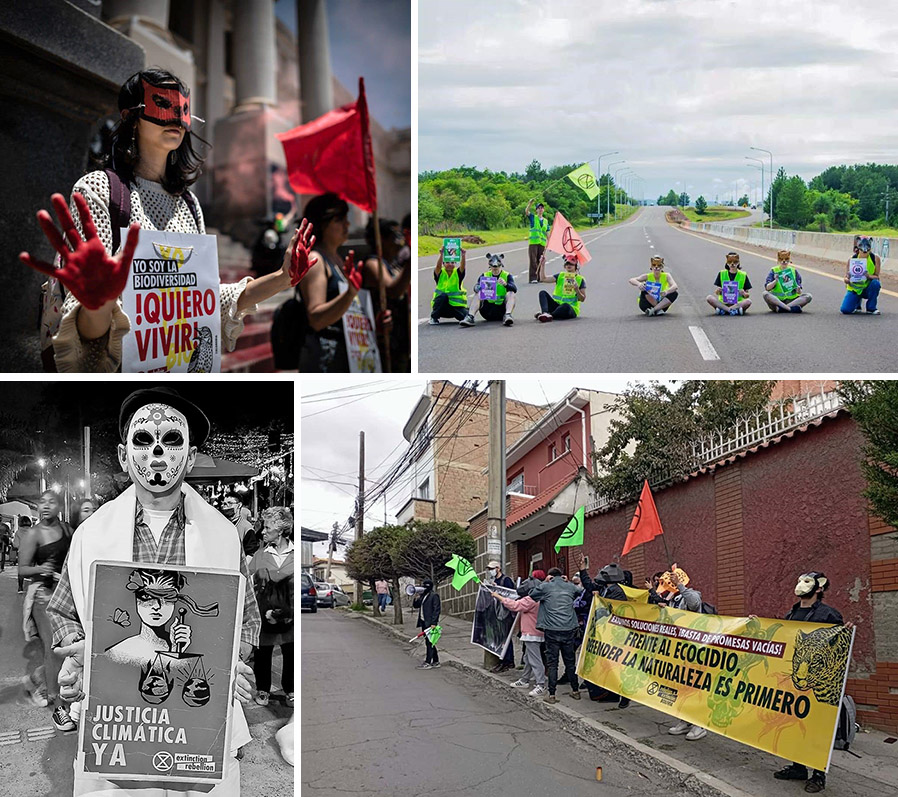
Rebeldes se manifiestan en Córdoba y Misiones, Argentina (arriba), en las calles de Medellín, Colombia, y junto al Servicio Nacional de Áreas Protegidas en La Paz, Bolivia (abajo).
En toda África, incluidas la República Democrática del Congo, Nigeria, Ruanda, Senegal, Tanzania y Uganda, rebeldes celebraron seminarios con agricultores, estudiantes y grupos de mujeres para debatir las causas y repercusiones de la pérdida de biodiversidad, y concienciar sobre las prácticas de cultivo sostenibles, así como sobre la necesidad de conservar los espacios salvajes.
Las rebeldes de Zimbabue (¡bienvenidas, XR Zimbabue!) celebraron la COP15 plantando árboles en una parte deforestada de una montaña vendida a una empresa de extracción de piedra. El ayuntamiento de Mutare dio luz verde a la cantera el año pasado a pesar de que ponía en peligro a las residentes locales y su suministro de agua.
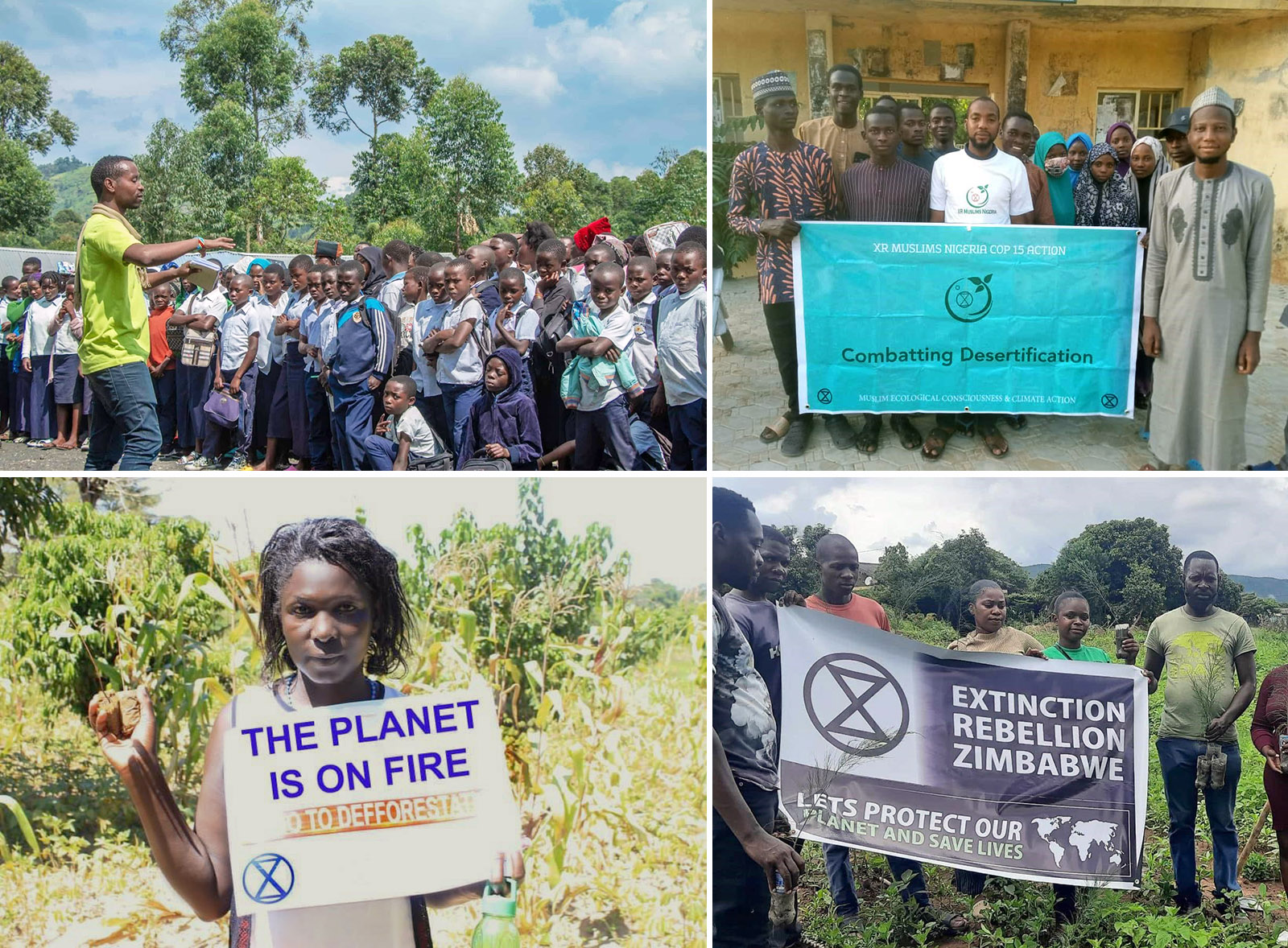
Rebeldes debaten sobre la conservación de los humedales en la RDC, la lucha contra la desertificación en Gumel (Nigeria) (arriba), el fin de la deforestación en Iganga (Uganda) y la plantación de árboles en la montaña de Danagamvura (Zimbabue) (abajo).
En la misma Montreal, activistas del Collectif Antigone (que mantienen estrechos vínculos con XR Montreal) ayudaron a desplegar una pancarta gigante en la que se decía a los líderes mundiales que dejaran de seguir los caprichos de los multimillonarios ecocidas que intentan influir en la política mundial sobre biodiversidad.
Los pueblos originarios constituyen el 6% de la población mundial, pero protegen el 80% de la biodiversidad del planeta, por lo que las Lideresas Indígenas se reunieron en Montreal para garantizar que sus derechos quedaran consagrados en el acuerdo de la COP15.
Tras dos semanas de negociaciones, todas las partes acordaron un marco de cuatro objetivos y 23 metas. El texto final reconocía el liderazgo indígena como clave para recuperar la biodiversidad y pedía que los pueblos indígenas (así como todas las mujeres, niños y discapacitados) formaran parte de la toma de decisiones a nivel nacional.
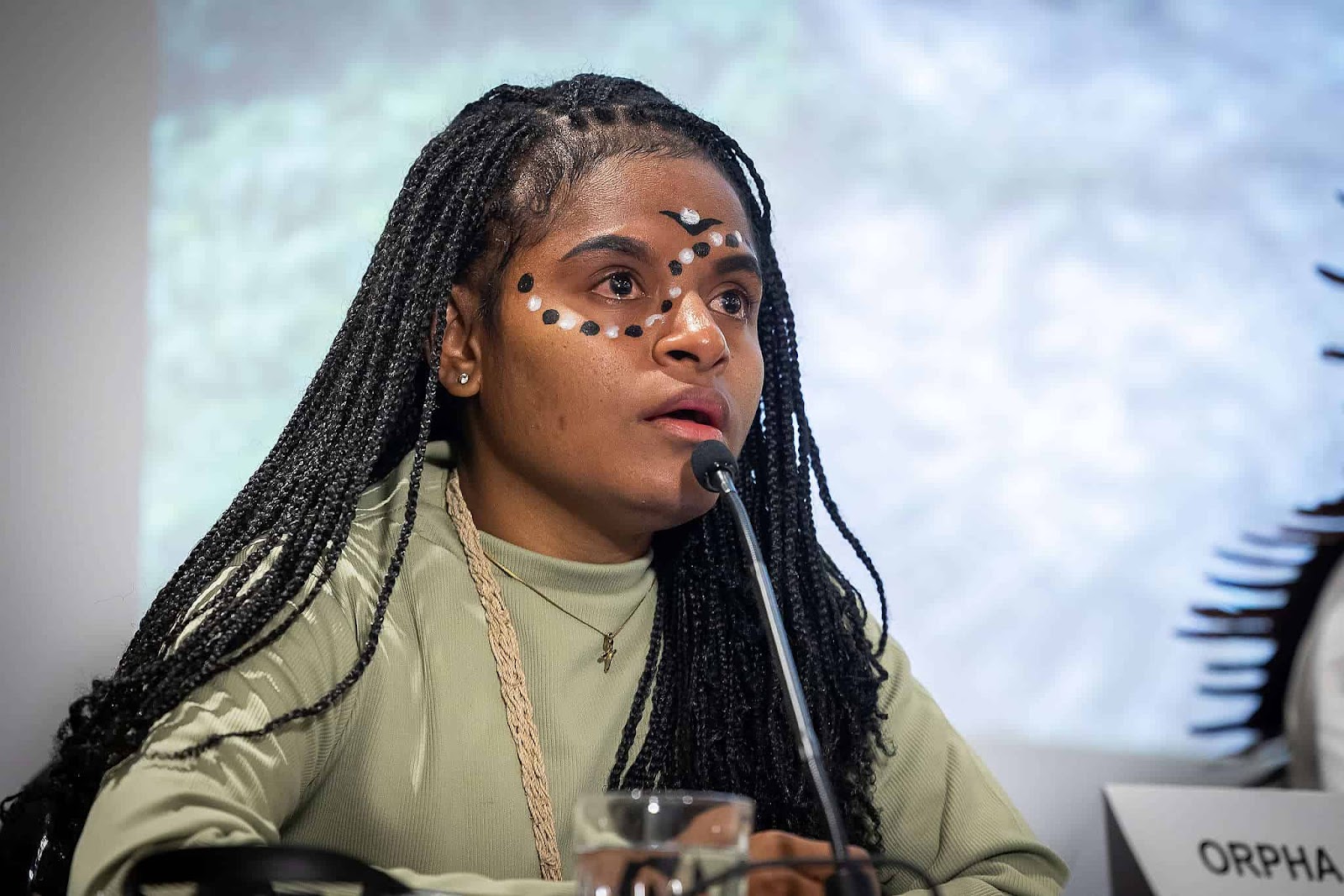
Una mujer namblong de Papúa Occidental (Indonesia) explica cómo una empresa de aceite de palma está destruyendo su bosque natal en una rueda de prensa en Montreal. Foto: Toma Iczkovits/Greenpeace
En otras partes, sin embargo, el Marco tiene graves problemas. Muchos de los objetivos están redactados en un lenguaje vago o comprometido. Incluso el objetivo principal de preservar el 30% de la tierra y el mar para la naturaleza en 2030 no excluye explícitamente el extractivismo de esas zonas protegidas.
Los planes corporativos como la compensación también se incluyen en los objetivos, lo que permite a las industrias ecocidas seguir explotando lo que queda de nuestra biodiversidad con fines lucrativos.
Y repitiendo la actuación de la COP27, el Norte Global se niega a dar fondos suficientes al Sur Global para detener el colapso planetario. El Sur es rico en biodiversidad y para protegerla hace falta dinero. Las negociaciones estuvieron a punto de fracasar por este motivo, y la promesa final de 30.000 millones de dólares anuales dista mucho de ser suficiente.

En el centro de Montreal, activistas de la escalada despliegan una pancarta en la que piden a los multimillonarios que se aparten de la política de biodiversidad.
Pero el mayor problema de los objetivos es que no son jurídicamente vinculantes. Se espera que los gobiernos se vayan y elaboren sus propios planes para ponerlos en práctica, y luego informen en la COP16 en Turquía el próximo año, haciéndose eco del proceso fallido que siguió al Acuerdo de París.
La última vez que los gobiernos fijaron objetivos de biodiversidad de la ONU, en Japón en 2010, no lograron cumplir ni uno solo.
Durante mucho tiempo, la biodiversidad ha ocupado un segundo lugar en la escena mundial tras la Crisis Climática, a pesar de que ambas crisis se derivan del consumo excesivo humano y de un sistema económico mundial que depende de ese consumo excesivo. Hasta que no se desmantele este motor ecocida, no habrá forma creíble de que nuestra atmósfera se descarbonice, ni de que nuestro planeta mantenga una biosfera sana.
Para más análisis sobre la COP15, consulte Lecturas obligadas y Los humanos de la COP15.
Rebeldes contra químicos para siempre
17 DIC | Lyon, Francia

Rebeldes con equipo de protección frente a una planta química que está envenenando toda la región.
Cientos de rebeldes de XR Lyon celebraron las fiestas atacando una planta local del gigante petroquímico Arkema. Esta multinacional es uno de los principales productores de productos químicos perfluorados.
Las sustancias químicas perfluoradas son altamente tóxicas y cancerígenas, y se acumulan en el suelo y el agua gracias a su casi indestructibilidad, lo que les ha valido el apodo de "sustancias químicas para siempre".
Las pruebas demuestran que los productos químicos de la planta han contaminado tanto la zona como a sus habitantes. Un documental emitido recientemente reveló que el suministro de agua de 200.000 personas contenía concentraciones peligrosas, al igual que la leche materna de las mujeres locales.
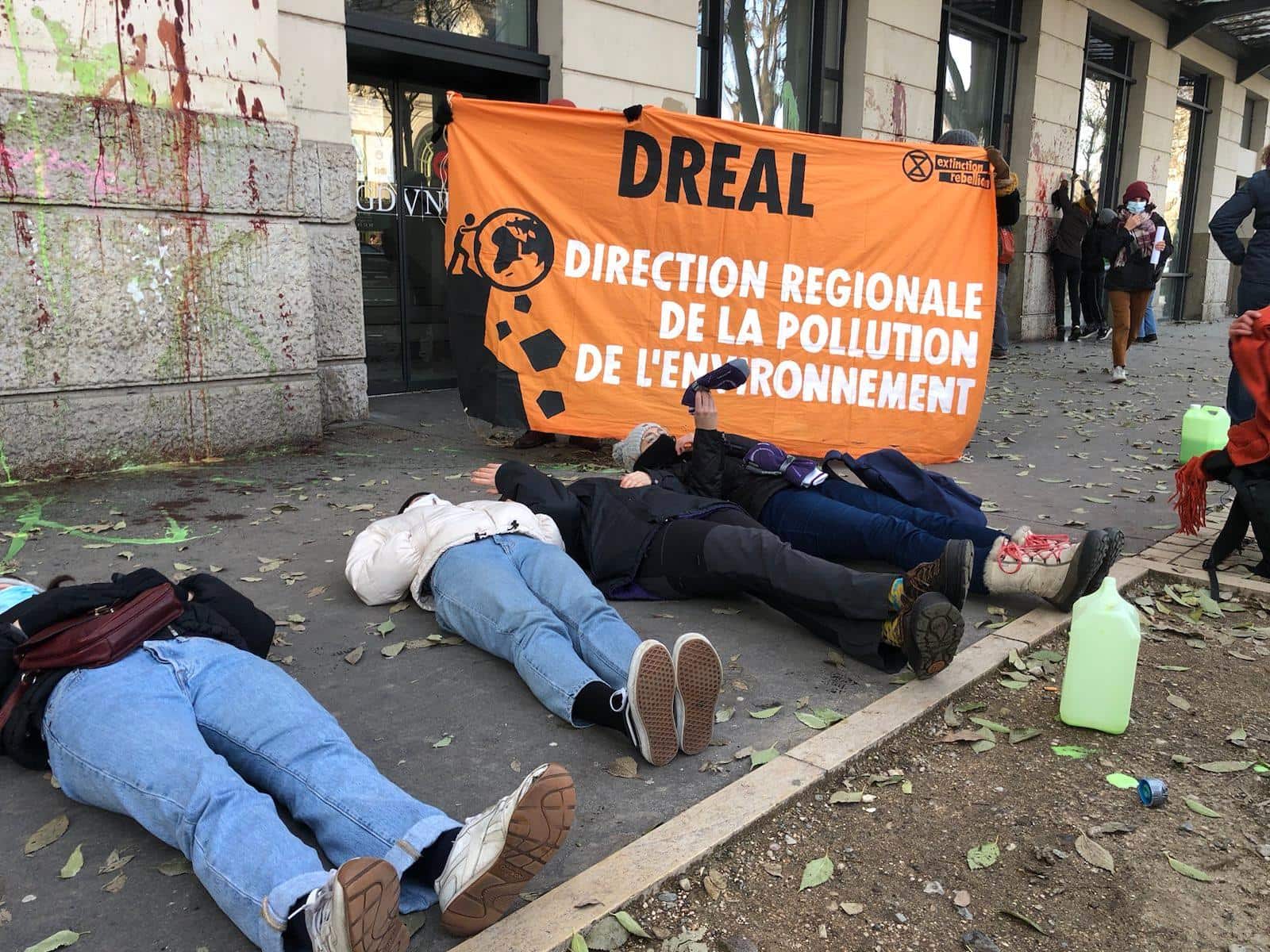
Los rebeldes se concentran ante el organismo de control regional que ha ignorado el ecocidio de Arkema.
Rebeldes vestidas con monos de protección y mascarillas irrumpieron en la planta, al sur de Lyon, tocando tambores y cantando mientras la seguridad se movilizaba rápidamente para desalojarlos. Mientras tanto, un segundo grupo de rebeldes se concentró ante DREAL, el organismo regional de control del medio ambiente que lleva décadas ignorando la contaminación crónica de la planta.
Alrededor de 300 rebeldes participaron en las acciones, y aunque la policía efectuó 20 detenciones, no se presentaron cargos contra ningún rebelde. El gobierno francés dio dos respuestas a las acciones de XR Lyon. Aunque no apoyó la interrupción, sí aceptó iniciar negociaciones en Europa para regular en mayor medida los contaminantes medioambientales.
En Estados Unidos, Arkema fue condenada con éxito por el estado de Michigan por contaminar el agua y el medio ambiente con productos químicos perfluorados. En Francia, no sólo no hay condenas, sino que Arkema goza de exenciones fiscales para continuar con su ecocidio.
XR Lyon seguirá de cerca cualquier evolución normativa y mantendrá la presión sobre el gobierno francés para que prohíba estos productos químicos que matan la Tierra.
Más información sobre XR Lyon contra Arkema (¿No habla francés? Utiliza DeepL).
Resumen de Acciones

13 DIC | Sydney, Australia: Una activista de Fireproof Australia y antigua rebelde queda en libertad bajo fianza tras una escandalosa condena de 15 meses por perturbar el Puente del Puerto de Sídney. La sentencia será recurrida en marzo. Más información en su primera entrevista desde su puesta en libertad.

14 DIC | Londres, Reino Unido: HSBC anuncia que dejará de financiar nuevos yacimientos de petróleo y gas (aunque excluye sus operaciones en Canadá, que pronto se venderán). La medida llega después de que Lloyds, otro gigante bancario británico, anunciara en octubre el fin de la financiación "directa" de proyectos de combustibles fósiles. No es el fin de la financiación de los combustibles fósiles por parte de los grandes bancos, pero es un comienzo. ¡La protesta funciona, gente! ¡Victoria parcial!
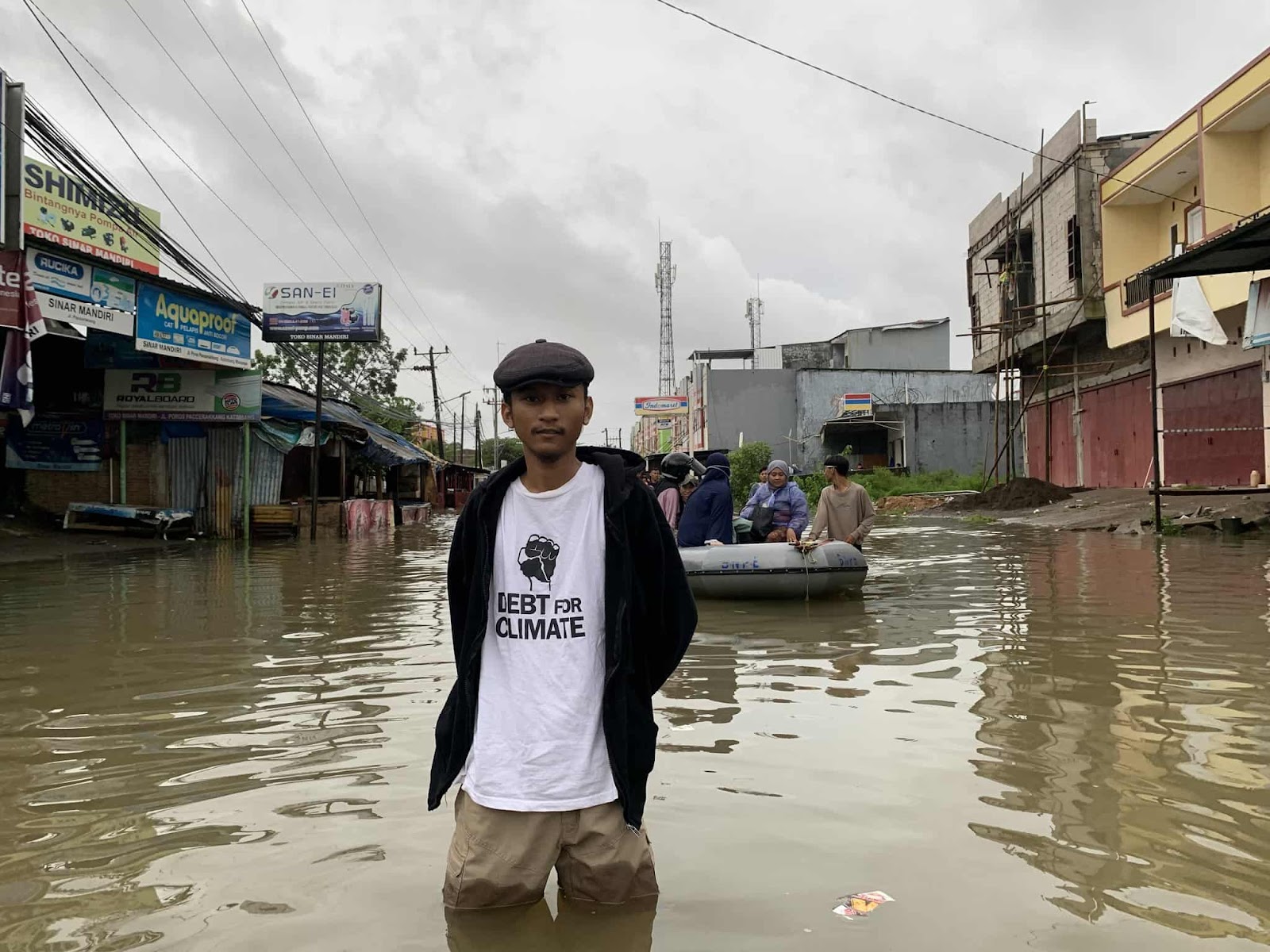
24 DIC | Makassar, Indonesia: Un rebelde se dirige a los líderes mundiales en medio de una inundación frente a su casa. Su mensaje: la crisis climática está ocurriendo hoy. Las pérdidas y los daños son reales. Actúa ya.
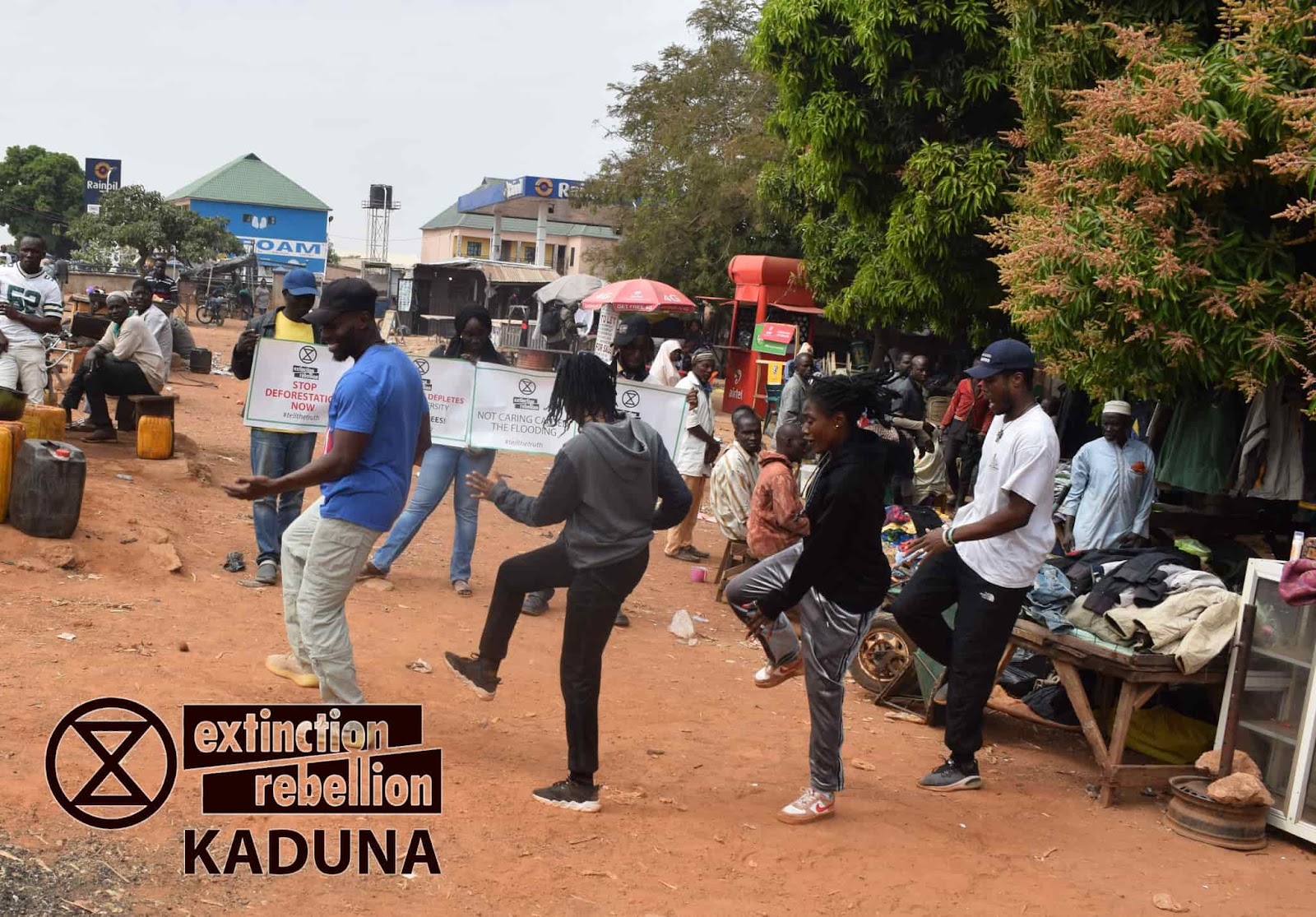
25 DIC | Kaduna, Nigeria: Un flash mob rebelde en Navidad pidió a su gobierno que ponga freno a la pobreza generalizada en el país tras meses de inundaciones extremas, y que reduzca la tala desenfrenada de árboles que está destruyendo la biodiversidad y empeorando las inundaciones.
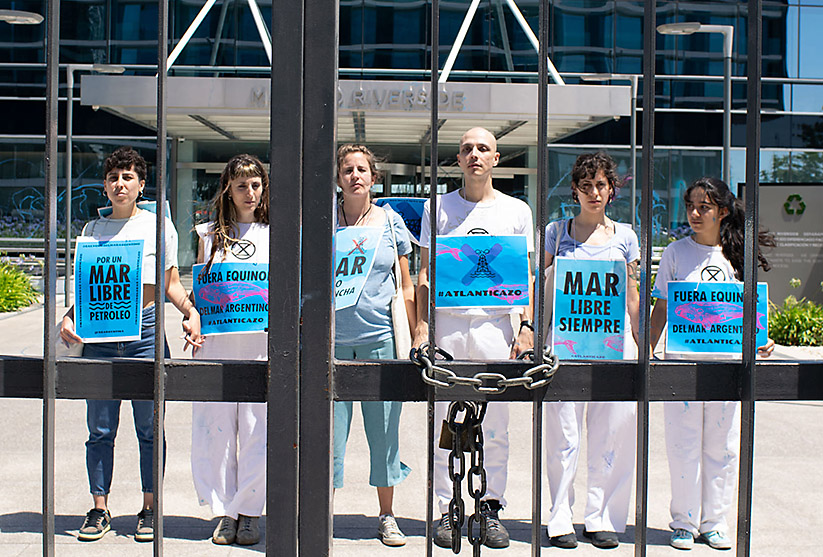
26 DIC | Buenos Aires, Argentina: La policía detuvo a ocho rebeldes tras protestar pacíficamente frente a las oficinas de la empresa de fracturación hidráulica Equinor. Los rebeldes utilizaron pintura lavable para escribir mensajes en el rascacielos de cristal antes de organizar una sentada frente a su entrada. Los rebeldes fueron puestos en libertad después de que se les levantara un acta de infracción, lo que significa que se enfrentarán a una pena de tres años de prisión.
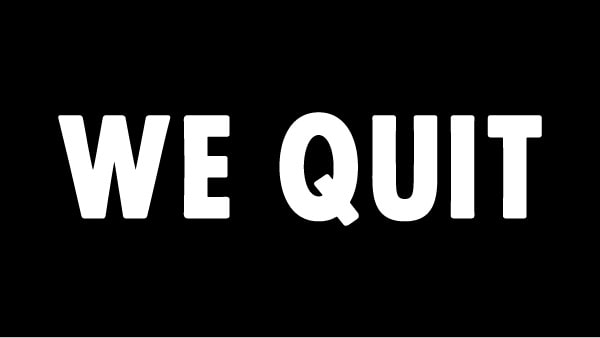
1 ENE | Reino Unido: A pesar del provocativo titular, XR UK no ha renunciado, sólo ha cambiado temporalmente sus tácticas, alejándose de las acciones que perturban al público para centrarse en acciones que fomentan la participación masiva. Este cambio forma parte de los preparativos para "The Big One", que comienza el 21 de abril, cuando XR UK espera reunir a 100.000 personas en torno al Parlamento de Londres. Todos somos necesarios para hacer historia, así que apúntate ya.
Este mes se han llevado a cabo tantas acciones que no podemos incluirlas todas en un solo boletín. Entérate de acciones increíbles en Italia, Suecia, Ruanda, Estados Unidos y más leyendo el Boletín XTRA: ¡un festín para los ojos y combustible extra para el alma!
Lecturas Obligadas
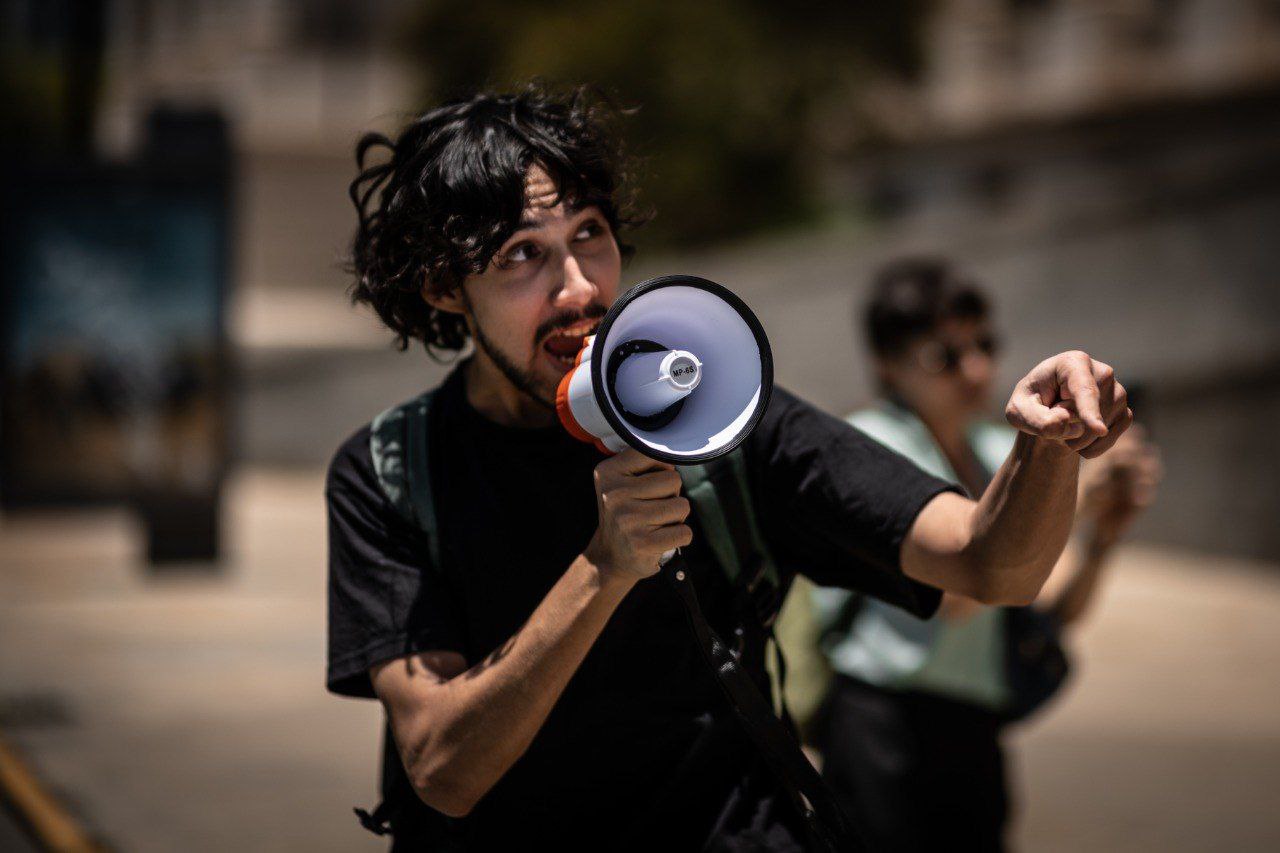
Un rebelde exige el fin del ecocidio frente a los juzgados de Córdoba, Argentina
En esta edición de Lecturas obligadas de la COP15, tenemos dos veredictos sobre el Marco final, dos historias sorprendentes de ecocidio empresarial reciente y en curso, una investigación sobre el rápido y en gran medida oculto declive de los insectos, y la verdadera solución a toda esta pérdida: ¡el decrecimiento!
Greenpeace: Una venda para la biodiversidad
Un análisis conciso del acuerdo de la COP15 que critica el texto final por contener "falsas soluciones", "lavado verde" y "protecciones sobre el papel pero en ninguna parte".
Resiliencia: Biodiversidad - Objetivos y mentiras
Este análisis del acuerdo de la COP15, del que son coautores un ex portavoz de XR UK y un economista verde, sostiene que hará falta mucho más que objetivos no vinculantes a largo plazo para revertir la crisis de la biodiversidad.
Guardian: La mina de carbón que se comió un pueblo indio
La historia de cómo el Grupo Adani destruyó insidiosamente un pueblo y arrasó un bosque virgen para hacerse con carbón por valor de 5.000 millones de dólares. Un caso de libro de ecocidio empresarial que la COP15 debería haber prohibido definitivamente.
Wired: La búsqueda para desactivar la bomba de carbono de Guyana
Un inspirador reportaje sobre cómo un antiguo abogado de BP intenta impedir que Exxon realice perforaciones petrolíferas frente a las costas de Guyana. Un caso que podría marcar un hito en el desmantelamiento de la industria petrolera.
Reuters: El colapso de los insectos
Este bello artículo investiga cómo los insectos están desapareciendo a un ritmo alarmante y por qué estos diminutos y misteriosos organismos son vitales para la vida en la Tierra.
Nature: El decrecimiento puede funcionar
Los investigadores en economía ecológica abogan por el decrecimiento: la reducción de las formas de producción destructivas e innecesarias para reducir el uso de energía y materiales, permitir una rápida descarbonización y acabar con el colapso ecológico.
Humanos de la COP15
*Douglas, Quebec, Canadá
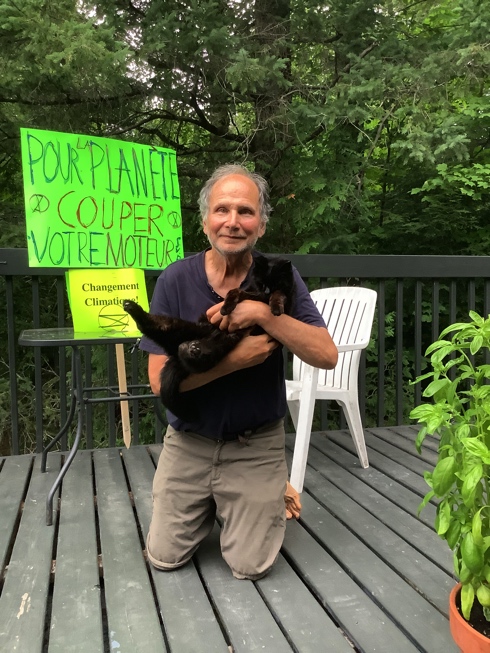
Fue el libro de Bill McKibben El Fin de la Naturaleza el primero que me hizo darme cuenta de la emergencia climática y ecológica, allá por 1989. Me impactó tanto el título que corrí a comprar un ejemplar. Este libro dejaba tan claro y concreto lo que le estábamos haciendo a nuestro mundo, lo que estábamos destruyendo.
He seguido el desarrollo de XR desde que surgió en 2018, y formo parte de XR Québec. En diciembre de 2022, junto con otras 18.000 personas, asistí a la COP15 en Montreal, no muy lejos de mi casa en Canadá. Fue una mezcla de jóvenes activistas apasionadas, defensoras indígenas y científicas, así como figuras políticas y empresariales aparentemente incapaces de pensar más allá de nuestro statu quo ecocida.
Aunque hubo mucho lenguaje prometedor, me he referido a la COP15 como la conferencia sobre biodiversidad "pide un deseo". Los casi 200 países participantes adoptaron cuatro objetivos generales y veintitrés metas para 2030, pero el principal problema -y la razón por la que utilizo el término "pedir un deseo"- es que no son jurídicamente vinculantes. El acuerdo es un conjunto de "ambiciones". Por tanto, el acuerdo en sí es sólo el principio. Ahora necesitamos, urgentemente, hacer cumplir estos objetivos. Tenemos que actuar de forma radical y rápida.
Otro problema es la vaguedad e insuficiencia de algunos de los objetivos. Por ejemplo, el número tres se refiere a la conservación de "al menos el 30% de las zonas terrestres, las aguas continentales y las zonas costeras y marinas" para 2030. Pero esto es demasiado vago, y "al menos el 30%" no es suficiente. Uno de mis héroes, el difunto biólogo y escritor Edward O. Wilson, dijo que tenemos que asegurarnos de que al menos el 50% de la naturaleza esté protegida.
Fue bueno ver que la defensa de los protectores de la naturaleza -cientos de los cuales son asesinados cada año- se incluía en el acuerdo, pero de nuevo, sin un marco legal, es sólo un deseo.
Una pregunta crucial para mí es: ¿cómo se inspira el amor por la naturaleza en otras personas? ¿Se puede educar a los demás para que lo sientan? Yo solía dirigir festivales de música, en los que incorporaba a la programación conversaciones sobre la biodiversidad y el clima. Para mí tenía mucho sentido, y creo que el clima y la ecología deberían formar parte de nuestra educación en la escuela y la universidad, y deberían impregnar cada parte de nuestra cultura.
También creo que debemos trabajar individualmente y en nuestras comunidades locales, y crear rápidamente Asambleas de Ciudadanos en todo el mundo, como exige XR, sin dejar de participar en la desobediencia civil siempre que sea posible.
Subyacente a todo esto, debemos incorporar la naturaleza a nuestra comprensión de nosotros mismos en el mundo. Y debemos preguntarnos: ¿qué restricciones vamos a imponer al mundo rico para proteger la vida en la Tierra, incluida toda la vida humana? Es una pregunta impopular, pero que exige una respuesta.
Lee sobre la visita de Doug a la COP15 en su blog Georgian Triangle Earth Day Celebration
Si conoces (o eres) un/a rebelde en alguna parte del mundo con una historia que contar, contáctanos en xr-newsletter@protonmail.com
Rincón de la solidaridad
Stop EACOP
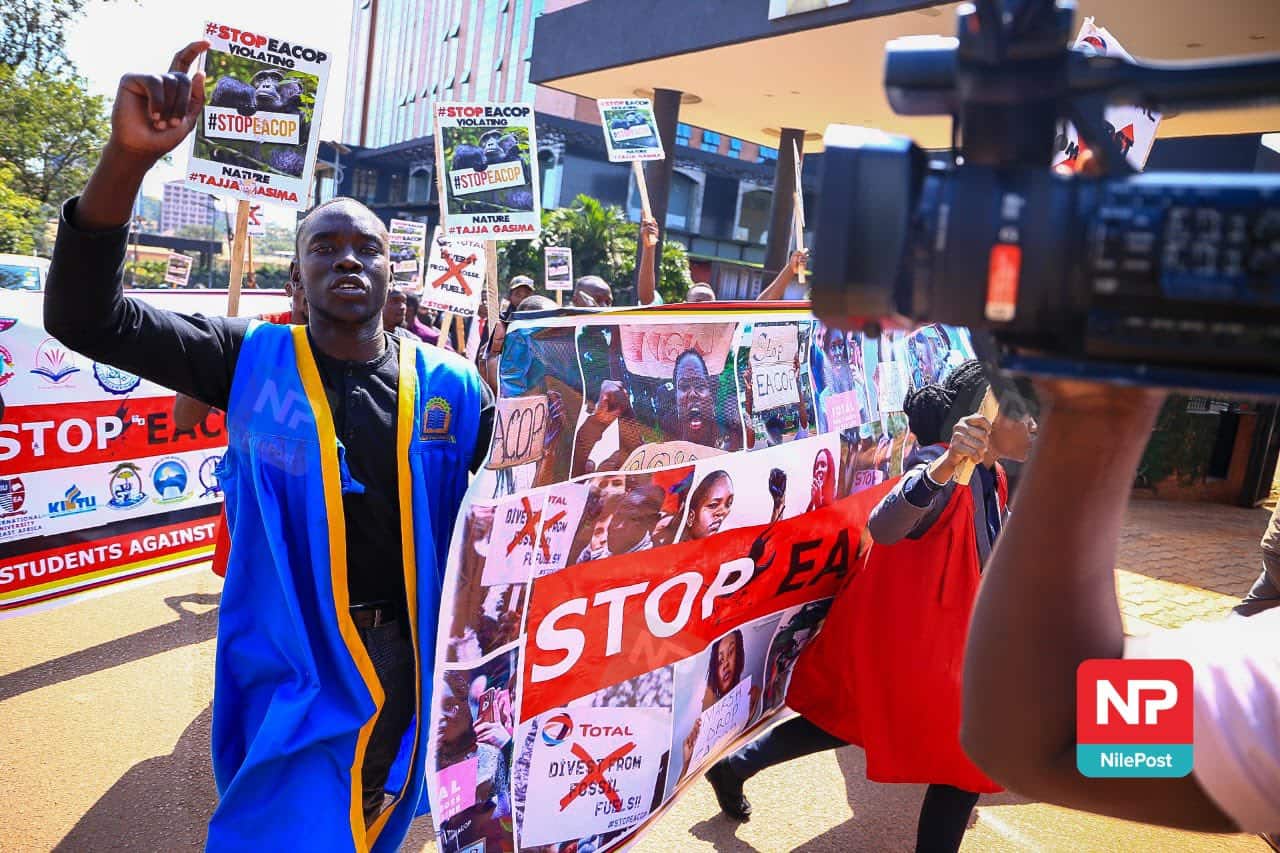
Estudiantes de Stop EACOP inician su marcha por Kampala. La policía esperaba.
Estamos viviendo una Crisis Climática sin precedentes gracias al consumo excesivo de combustibles fósiles. Si hay algo que realmente no necesitamos son 1.445 kilómetros de un nuevo oleoducto.
El oleoducto de África Oriental (EACOP) es una iniciativa del gigante petrolero francés TotalEnergies, la China National Offshore Oil Corporation y el Gobierno ugandés. Se supone que se extenderá desde los yacimientos petrolíferos de Uganda hasta el puerto de Tanga, en Tanzania. Sus efectos sobre las comunidades locales y el medio ambiente serían desastrosos.
Una gran coalición de activistas se ha organizado para detener el EACOP mediante protestas, acciones legales e intentos de bloquear los flujos financieros y los seguros del proyecto. La dura reacción del gobierno ugandés demuestra que han dado en el clavo.

La policía metió a nueve activistas en jeeps y los encarceló durante casi una semana.
En octubre, varios valientes estudiantes iniciaron una marcha de protesta por la capital, Kampala, exigiendo a su gobierno que detuviera el EACOP. Al menos nueve fueron detenidos y recluidos en la prisión de máxima seguridad de Uganda durante casi una semana.
Ahora se enfrentan a cargos de incitación a la violencia. "Ejercieron su derecho a protestar pacíficamente y fueron detenidos", afirma una activista de Stop EACOP, que trabaja bajo seudónimo por su seguridad.
El gobierno ugandés no trata todas las protestas por igual. Cuando estudiantes y escolares de toda Kampala se manifestaron "inesperadamente" a favor de EACOP y en contra de una resolución de la UE que condenaba el oleoducto, la protesta recibió amplia protección policial.
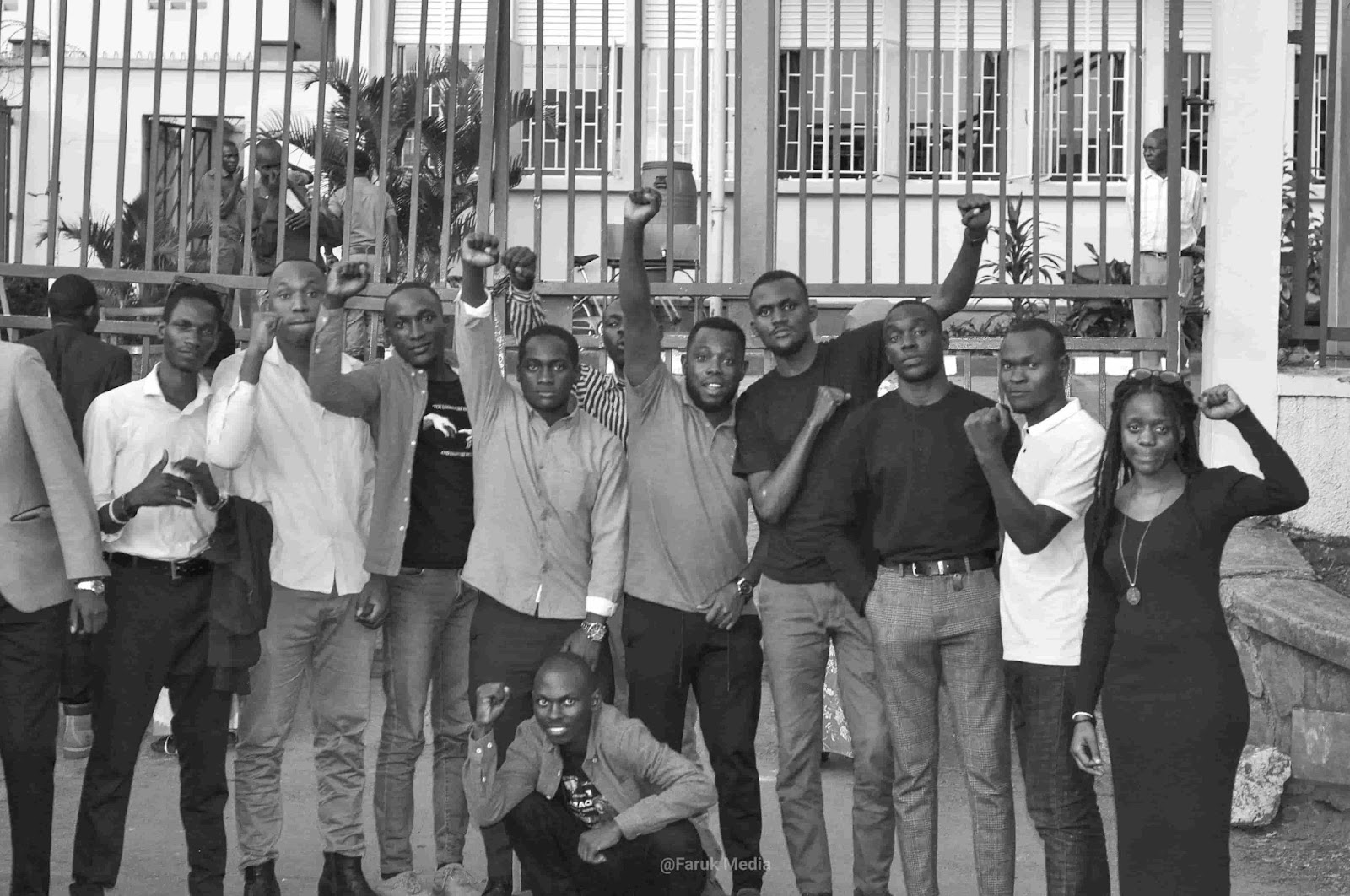
Los nueve estudiantes quedaron finalmente en libertad bajo fianza, pero se enfrentan a cargos falsos.
"Más de 100.000 personas se verían o se han visto desplazadas por el oleoducto", explica el activista de Stop EACOP. "La mayoría son agricultores, cuyo sustento depende de sus tierras. Conozco a muchas familias del oeste de Uganda que perdieron su independencia."
"Ahora deben cultivar la tierra de otros. Eso afecta a sus ingresos, a su capacidad de enviar a sus hijos, sobre todo a las niñas, a la escuela. Y vemos que ocurren cosas similares en Tanzania."
Cuando se trata de proyectos de combustibles fósiles, los daños sociales y ecológicos van de la mano, y no sorprende que el oleoducto suponga también una enorme amenaza para muchas reservas naturales, cada una de ellas un punto caliente de biodiversidad y hogar de especies en peligro de extinción.
También afectará a reservas vitales de agua dulce como la cuenca del lago Victoria, que proporciona alimentos y agua potable a 40 millones de personas. Y por último, están las emisiones de carbono del crudo que fluiría por el oleoducto: 34 millones de toneladas al año.
¡Únete a la lucha para detener el EACOP! Actúa a nivel local y mundial para derribar este oleoducto.
Libro del Mes
No More Fairy Tales: Stories to Save Our Planet, editado por D.A. Baden
No More Fairy Tales (No más cuentos de hadas) es una colección de relatos cortos en los que aparecen personajes que desarrollan soluciones climáticas o viven en soluciones climáticas, o ambas cosas.
Algunos están ambientados en un futuro lejano, en mundos muy distintos de nuestra realidad actual. Otros tienen una ambientación más o menos contemporánea. Todos los relatos terminan con una nota a pie de página en la que se sugiere una lectura adicional sobre la solución sugerida.
Aunque no todos los relatos son del mismo autor, y algunos son extractos de obras más largas publicadas anteriormente, se entrelazan: al leer la colección, se encuentran personajes que viven soluciones propuestas por los personajes de relatos anteriores.
La ficción escrita para transmitir un mensaje rara vez está tan bien lograda como la ficción escrita por sí misma, y de hecho algunos de estos cuentos que no son de hadas se leen como un poco simplistas, y sin embargo son atractivos, accesibles y relacionables. Algunos contienen verdaderas joyas.
Y mientras que los ensayos que proponen las mismas soluciones pueden ser áridos o aburridos, estas historias hacen su trabajo de una manera que no sólo es clara y eficaz, sino también realmente agradable de leer. Los personajes te importan y esperas que lo consigan.
Y esperas que nosotros lo consigamos.
Evita Amazon. Apoya a las librerías locales. Compra tus libros en Bookshop o Hive.
Próximas Acciones
DeudaXClima: ¡Llamamiento global!
27 FEBRERO | Global

¡Dale la vuelta a la tortilla del colonialismo financiero y haz responsable al Norte Global de su deuda climática en una fecha histórica para la cancelación de la deuda!
¿Por qué el 27 de febrero? Es el 70 aniversario de la condonación de la deuda de la Alemania nazi tras la Segunda Guerra Mundial, que condujo a su "Milagro Económico".
En la actualidad, Alemania es la cuarta potencia con más votos en el FMI y el cuarto contaminador histórico del mundo. Alemania, y el resto del Norte Global, tienen una enorme deuda climática con el Sur Global, ¡y este día tomaremos medidas a nivel mundial para que la paguen!
Si fue posible cancelar la deuda de los nazis entonces, ¡sin duda es posible cancelar la deuda del Sur Global ahora, y permitir una transición justa!
Ponte en contacto! info@debtforclimate.org
Anuncios
Red Rebelde de Discapacitados XR: ¡Ayúdanos a crear Zine!
Envío de trabajos hasta el 31 de MAYO de 2023

XR Disabled Rebels Network (DRN) pide a las rebeldes diversas funcionales de todo el mundo que envíen contribuciones para un zine (como un pequeño panfleto) que sensibilizará sobre el impacto de la crisis climática en las personas con diversidad funcional.
Las contribuciones pueden enviarse por correo electrónico a xr.inclusion@protonmail.com
Serán bienvenidas las contribuciones de personas sordas, discapacitadas, neurodiversas o con enfermedades crónicas o de larga duración. Por favor, indique en su correo electrónico si desea que se incluya su nombre o si prefiere utilizar un seudónimo o permanecer en el anonimato.
Todos los trabajos escritos deben estar en inglés. Los trabajos escritos pueden enviarse como archivo o por correo electrónico. Todas las imágenes deben estar en formato JPEG.
El plazo de presentación de candidaturas para la primera edición finaliza el 31 de mayo de 2023.
Las contribuciones pueden ser de diversa índole, incluidas anécdotas personales/artículos escritos (límite de 1500 palabras), poesía, cartas, fotos y todo tipo de obras de arte.
Los temas tratados pueden incluir el impacto del cambio climático en las condiciones de salud de las personas con discapacidad, la medicación, el apoyo, la vivienda, el transporte, así como los sentimientos de exclusión del activismo climático, la eugenesia/estigma, el darwinismo climático y los refugiados climáticos discapacitados.
Una vez terminado, se podrá descargar gratuitamente un ejemplar digital. Si se encuentra un editor, también se pondrá a disposición una copia impresa por un módico precio.
Muestra tu solidaridad con XR Corea del Sur
Firma su petición ahora
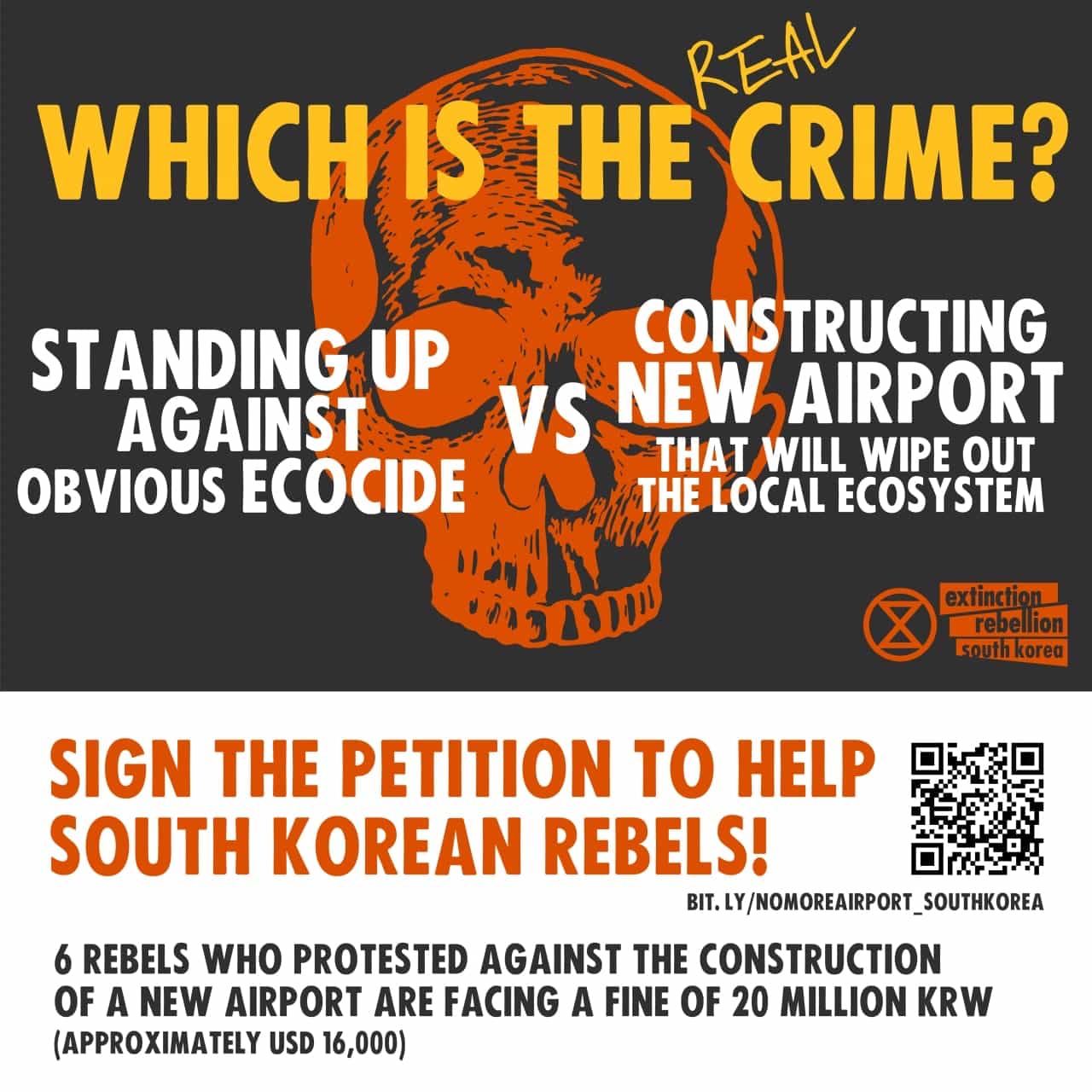
Seis rebeldes de Corea del Sur fueron multados con 16.000 dólares por una acción directa contra la construcción de un nuevo aeropuerto. Desobedecieron la orden, pasaron por seis juicios el año pasado y ahora se enfrentan a un juicio final el 17 de enero. Vea el vídeo de la acción.
Con la solidaridad de personas de todo el mundo, podemos cambiar las cosas.
Por favor, muestra tu solidaridad firmando la petición (¡se tarda menos de 1 minuto!)
Solarpunk Showcase 2023
¡Inscríbete ya!

No podemos detener el futuro, pero aquí hay una oportunidad para los escritores de todas las edades para imaginar y ayudar a dar forma al mundo que les gustaría vivir. Extinction Rebellion Wordsmiths abre su segunda ronda de narración Solarpunk tras el exitoso escaparate del año pasado.
Imagina un mundo en el que estemos más en armonía con la naturaleza y con nosotros mismos, y en el que hayamos encontrado la tecnología que nos ayude a conseguirlo: ¡eso es Solarpunk en acción!
Si no conoces Solarpunk, lee algunas de nuestras entradas favoritas del año pasado. Si ya lo conoces... ¡empieza a imaginar!
Para más información e inspiración, visita nuestra página web Solarpunk Showcase 2023 o escríbenos a xr-writers@protonmail.com
Gracias
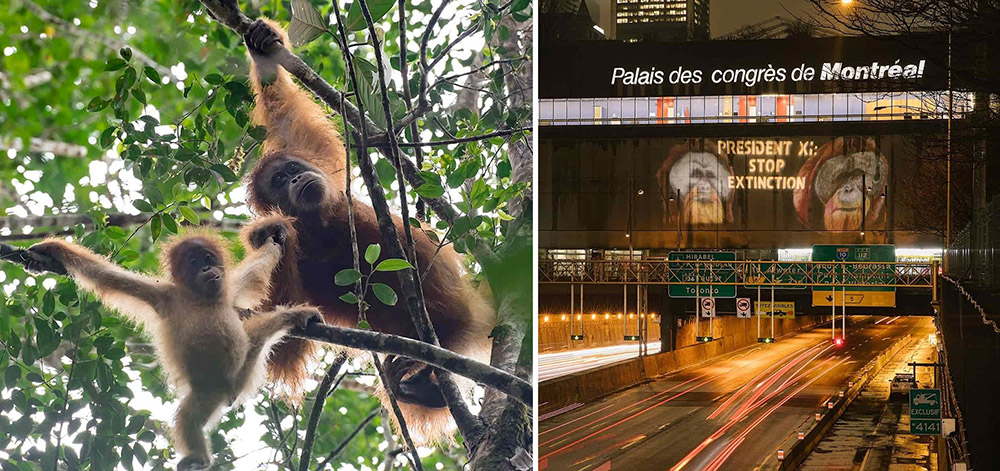
Activistas de Mighty Earth proyectaron mensajes por Montreal durante la COP15 pidiendo al presidente chino que detuviera la extinción del orangután Tapanuli. El Estado chino ha comprado recientemente un proyecto de presa en Indonesia que destruirá el último hábitat del gran simio más raro del mundo. Quedan menos de 800.
Gracias por leer, rebelde. Si tienes preguntas o comentarios, queremos oírlos. Contáctanos a xr-newsletter@protonmail.com.
Este boletín llega de la mano de XR Global Support, una red mundial de rebeldes que ayudan a nuestro movimiento a crecer. Necesitamos dinero para continuar este trabajo crucial.